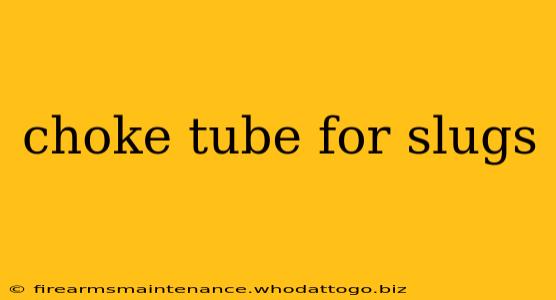Choosing the right choke tube for shooting slugs can significantly impact accuracy and overall performance. Unlike using shot, where a tighter choke constricts the shot pattern, slug performance is more nuanced. This guide will delve into the specifics of choke tube selection for slugs, helping you maximize your hunting or shooting accuracy.
Understanding Slug Gun Chokes
Unlike using birdshot or buckshot, where choke tubes significantly influence the shot pattern, the effect of choke tubes on slugs is less about pattern and more about stabilization and accuracy. The primary goal when choosing a choke for slugs is to achieve consistent, accurate shot placement downrange.
Different types of slugs react differently to various choke constrictions. For instance, a full choke might be ideal for rifled slugs but could negatively impact the flight of foster slugs. This is because the rifling on the slug itself interacts with the choke constriction.
Types of Slug Gun Chokes
Several choke tube options cater specifically to slug shooting, each offering unique benefits:
-
Cylinder Choke: This is the least restrictive choke and generally offers the best performance for foster-type slugs. The lack of constriction minimizes interference with the slug's flight path, particularly beneficial for slugs that are not rifled. However, accuracy can suffer at longer ranges.
-
Improved Cylinder Choke: A slightly tighter constriction than a cylinder choke, offering a balance between pattern density (though less important with slugs) and minimal interference with the slug's flight.
-
Modified Choke: This represents a moderate constriction. It's sometimes used with rifled slugs, offering a balance between accuracy and reduced risk of over-constricting the projectile.
-
Full Choke: A full choke is the tightest constriction. While it might offer improved accuracy with certain rifled slugs due to improved stabilization, it’s crucial to understand that it’s risky with non-rifled slugs. Over-constriction can lead to inaccurate shot placement and even damage to your firearm.
-
Slug Chokes (Specifically Designed): Many manufacturers offer choke tubes explicitly designed for slugs. These are often designated as "slug chokes" and frequently incorporate features to enhance slug stabilization and accuracy. These are generally the best option for optimal performance, provided they are designed for your particular slug type.
Choosing the Right Choke for Your Slug Type
The best choke for slugs depends largely on the type of slug you're using:
Rifled Slugs:
Rifled slugs possess their own rifling, which imparts spin for stability. With rifled slugs, a modified or full choke might enhance accuracy by further stabilizing the projectile, but it's important to test different chokes to determine the best performance for your specific setup. Over-tightening can lead to problems, so start with a modified and gradually increase constriction as needed.
Foster Slugs:
Foster slugs lack rifling. Therefore, they're more sensitive to choke constriction. A cylinder or improved cylinder choke is generally recommended for Foster slugs to minimize interference and maximize accuracy. Tighter chokes will likely negatively affect their accuracy.
Sabot Slugs:
Sabot slugs feature a plastic or other material sabot that encapsulates the slug. These are generally more forgiving of various choke constrictions, offering better performance than foster slugs across a wider range of chokes. Testing different chokes is still recommended to optimize accuracy.
Testing and Experimentation
The best way to determine the optimal choke tube for your specific shotgun, slug type, and shooting style is through thorough testing. Start at the less restrictive end (cylinder or improved cylinder) and progressively try tighter chokes. Record your results at various distances to identify the choke that provides the most consistent accuracy.
Remember safety precautions during all testing and shooting activities. Always follow responsible firearm handling practices and shoot at an approved range or hunting area.
Conclusion
Selecting the proper choke tube for slugs requires understanding the interaction between the slug type, the choke constriction, and your specific firearm. Through careful consideration and experimentation, you can significantly improve your accuracy and overall shooting performance. Remember that what works best for one setup may not be optimal for another. Invest the time in testing to discover your ideal combination.

